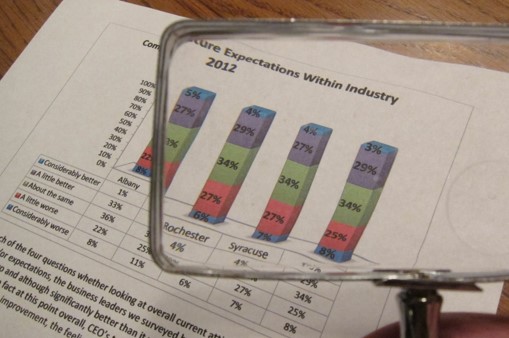Siena College: 9th Annual Upstate New York Business Leader Survey
CEO Confidence Drops across Upstate
Cap Reg Most Upbeat; Buffalo, Rochester, Syracuse all Below Breakeven Point
Business Leaders Say Obamacare, Gov’t Regulation Hurt Bottom Line; Have Little Confidence in Local Government, Albany, Less in D.C.
Call for Tax Reforms, Infrastructure; Strongly Oppose $15 Minimum Wage
Loudonville, NY. Across Upstate New York, CEO confidence fell more than 15 points this year demonstrating more pessimism than optimism among leaders of private for-profit companies according to the ninth annual Upstate New York Business Leader Survey from Siena College sponsored by the Business Council of New York State, Inc. The Index of Business Leader Confidence, computed based on interviews with 531 business leaders of companies from Buffalo, the Capital Region, Rochester and Syracuse stands at 94.8, down from 110.4 last year, just below the breakeven point of 100 at which overall optimism and pessimism towards the current and future economic conditions are balanced.
“Only the CEO’s of the Capital Region, although down from last year, retain a confidence score above 100. Across Central and Western New York, business leaders say that 2015 did not live up to their expectations and while three in 10 anticipate a strong 2016, most predict more of the same or worsening conditions. Forty-five percent, down from 49 percent, anticipate revenue growth and 35 percent, down from 41 percent, expect their profits to increase in 2016,” said Siena College Research Institute Director Don Levy.
Seventy-four percent of CEO’s say that the Affordable Care Act, Obamacare, is having a negative impact on their business and 69 percent agree with those calling for ‘repeal and replace’.
CEO’s cite health care costs (78 percent), governmental regulation (68 percent) and taxation (65 percent) as challenges that they are concerned about. Asked to name the single greatest challenge, governmental regulation is identified most often by over one in four. Only 19 percent of CEO’s think local government is doing either an excellent or good job supporting business and only 13 percent are confident in the ability of New York’s government to improve the climate. The federal government receives even lower marks with two percent saying the federal government is now doing at least a good job facilitating business success with only seven percent being confident in Washington’s ability to improve conditions.
Sixty-three percent of CEO’s would like to see the Governor and Legislature focus on business income tax reform, 58 percent stress spending cuts, 54 percent call for personal income tax reform and 42 percent support infrastructure development. Over 80 percent say the cost of complying with state regulations and state and local taxes are at least somewhat of an obstacle to growing their business in New York. Similarly, 87 percent of Upstate CEO’s oppose increasing the minimum wage for all New Yorkers to $15 per hour.
“These CEOs are speaking loudly and clearly. The message is, they are succeeding in creating jobs and growing our economy in spite of our state’s tax and regulatory policies. And they are asking our legislative leaders to pass a pro-business agenda that will benefit the entire state,” according to Heather C. Briccetti Esq., president and CEO of The Business Council of New York State.
Thirty-three percent, virtually unchanged from 32 percent last year, of Upstate CEO’s plan to increase their workforce in 2016. Engineering/Construction (47 percent) and Manufacturing (38 percent) businesses have the most aggressive hiring plans. Overall, 54 percent give their local area a good or excellent grade on workforce suitability but a quarter say that a lack of skilled workers poses a very significant obstacle to their growth.
Data security was named by 70 percent of CEO’s as at least a somewhat significant risk that their company faces followed by key employee illness or death (61 percent) and work related accidents (53 percent). More than half of CEO’s say that in order to mitigate these risks they have instituted mandatory trainings for employees, added materials to manuals, hired consultants to advise them and nearly half have purchased additional insurance. As they consider the risks they face, 40 percent say that they feel less safe today than they did two years ago.
Fifty-five percent of Upstate CEO’s, down from 58 percent a year ago, plan to invest in fixed assets in 2016.
“We are a long way from the frightening recession. CEO’s, especially the most optimistic, are focused on growing demand for their product or services more so than cutting costs. But, with only 30 percent saying their local area is a place where businesses can succeed and 29 percent saying that they would locate their firm in the Empire State if they had it to do all over again, Upstate CEO’s are feeling the pinch. They are less bullish than they were a year ago and they anxiously await answers from Albany as well as the campaign trail. In the meantime, business will take place across Upstate at a cautious and steady pace,” Levy says.
This Siena College Poll was conducted October – December, 2015 by telephone, mail and internet interviews with 531 Business Leaders from the Albany, Buffalo, Rochester and Syracuse MSA’s. Sponsorship for the 2015 Upstate Business Leader Survey was provided by The Business Council of New York State. In each of the four MSA’s the study is released in conjunction with the following media partners: Albany: The Times Union; Buffalo: The Buffalo News; Rochester: The Rochester Business Journal; Syracuse: The Central New York Business Journal. The Siena College Research Institute, directed by Donald Levy, Ph.D., conducts political, economic, social and cultural research primarily in New York State. SRI, an independent, non-partisan research institute, subscribes to the American Association of Public Opinion Research Code of Professional Ethics and Practices. For more information, call Don Levy at (518) 783-2901 or dlevy@siena.edu. For survey cross-tabs and frequencies: www.Siena.edu/SRI





